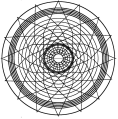Utilitarian Discourse of Important Socio-Political Issues in Russian Media
Abstract
The main goal of the given research is to test the hypothesis, that the public opinion is not determined only by media. Thus, the relation between media and public opinion is an issue of complex interdependence caused by structurally determined dominant narratives. The given research extends the inquiry focused on a shortage of Russian citizens discursive means which determine relationships towards changing institutional structure (Kashirskikh 2014). The research relies on example of Russian media-frames accompanying lightening of most important social issues (economic crises and corruption) in 2016-2017. The research results revealed utilitarian discourse to be dominant by lightening important social issues in Russian media. The lack of functioning representation of citizens in institutionally structured “communicative sphere” is projected to “communicative sphere” of meaning production thus to the news covering major socio-political issues.
Downloads
References
Becker, J. (2004). Lessons from Russia: A Neo-Authoritarian Media System. European Journal of Communication, 19(2), 139-163.
Bennett, W. L., & Iyengar, S. (2008). A new era of minimal effects? The changing foundations of political communication. Journal of Communication, 58 (4), 707–731
Buchstein, H. (1996). Die Zumutungen der Demokratie. Von der normativen Theorie des Bürgers zur institutionell vermittelten Präferenzkompetenz’. Politische Theorien in der Ära der Transformation, (ed. von Beyme, C. & Offe, C.), Westdeutscher Verlag GmbH Opladen, 295-324.
Charles T. (1998). Contentious Conversation. Social Research, 65(3), 491-510.
Cohen, J. (1996). Deliberation and Democratic Legitimacy. Deliberative Democracy: Essays on Reason and Politics, (ed. Bohman, J. & Rehg, W., Massachusetts Institute for Technology, 67-92.
Elster J. (1996). The Market and the Forum: Three Varieties of Political Theory. Deliberative Democracy: Essays on Reason and Politics, (Bohman J., & Rehg, W. eds.), Massachusetts Institute for Technology, 3-34.
Goodin R. E. (2000). Democratic Deliberation within. Philosophy & Public Affairs, 29(1), 81-109.
Hall, S. (1997). The work of representation. Representation: Cultural representations and signifying practices (ed. S. Hall), London: Sage, 13-64.
Hay C. (2008). Constructivist Institutionalism. Oxford Handbook of Political Institutions, (ed. Binder S. A., Rhodes R. A. W. & Rockman B. A.), Oxford Handbooks Online, 1-27.
Kiriya I. (2014). Social Media as a Tool of Political Isolation in the Russian Public Sphere. Journal of Print and Media Technology Research, 3(2), 131-138.
Manin, B. (1987). On Legitimacy and Political Deliberation. Political Theory, 15(3), 338-368.
McQuail, D. (2005). McQuail’s mass communication theory (5th ed.), London: Sage.
Petrov, N., Lipman, M. & Hale, H. (2014). Three Dilemmas of Hybrid Regime Governance: Russia from Putin to Putin. Post-Soviet Affairs, 30(1), 1-26.
Reese, S. D. (2001). Introduction. Framing public life: Perspectives on media and our understanding of the social world (eds. S. D. Reese, O. H. Gandy, & A. E. Grant), Mahwah, NJ: Erlbaum, 1–31.
Schmidt, A. V. (2008). Discursive Institutionalism: The Explanatory Power of Ideas and Discourse. Annual Review of Political Science, 11, 303-326.
Schimpfossl, E. & Yablokov, I. (2014). Coercion or Conformism? Censorship and Self-Censorship among Russian Media Personalities and Reporters in the 2010s. Demokratizatsiya, 22(2), 295-311.
Smyth R. & Oates S. (2015). Mind the Gaps: Media Use and Mass Action in Russia. Europe-Asia Studies, 67(2), 285–305.
Sztompka P. (2000). Cultural Trauma. The Other Face of Social Change. European Journal of Social Theory, 3(4), 449-466.
Sztompka, P. (1991). Dilemmas of the Great Transition (A Tentative Catalogue in Programm on Central and Eastern Europe Working Paper Series 19, November 29-30).
Szostek J. (2017). Consumption and Anti-Western Narratives in Russia: A Case Study of University Students. Europe-Asia Studies, 69(2), 284–302.
Toepfl, F. (2013). Making Sense of the News in a Hybrid Regime: How Young Russians Decode State TV and an Oppositional Blog. Journal of Communication, 63(2), 244-265.
Toepfl, F. (2014). Four Facets of Critical News Literacy in a Non-democratic Regime: How Young Russians Navigate Their News. European Journal of Communication, 29(1), 68-82.
Van Gorp B. (2007). The Constructionist Approach to Framing: Bringing Culture Back In, Journal of Communication 57 (1), 60–78.

